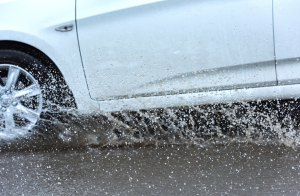Jewish law states that, in such a situation, if the driver of the car saw the pedestrian and the puddle, and could have easily avoided splashing him by slowing down or veering away from the puddle, he is liable for damages caused by the splashing of the water (i.e., cleaning the suit). But if he did not notice either the puddle or the pedestrian, he is exempt.
This is based upon a general Talmudic ruling which states, “It’s not the way of one walking along the road to inspect the ground,” as he walks in a normal fashion in the street or public domain. For that reason, says the Talmud, if one left his fruits in the street and someone stepped on them while walking normally and didn’t notice them, he is not liable to pay for the fruits, as he is not obligated to keep checking his steps. On the contrary, the one who put the fruits in the street is considered to have ruined his own fruits by putting them in a place of impending ruin.
Here the case is slightly different, as one doesn’t have the right to leave their fruits in the street, but the pedestrian has as much right to walk along the street as does the car to drive upon it. However, since the driver of the car is not considered to be negligent as long as he was driving within the normal speed limit and didn’t notice the puddle, and wasn’t obligated to look for it, the authorities of Jewish law have ruled that he is exempt from an obligation to pay.
This is only as far as the obligation goes. Certainly, if the other person is upset and asking to be compensated and one would like to go above the letter of the law and pay anyway, this would affect a Kiddush HaShem, a sanctification of the name of G-d. In your case that the person is not asking this and is not upset, you have no obligation under Jewish law to do so. This being said, if it was a rainy day and there’s reason to assume there might be puddles in the street, the ruling could be different, so best you consult with a rabbi well-versed in monetary matters to discuss the details of your situation.
Sincerely,
Rabbi Yerachmiel Fried


